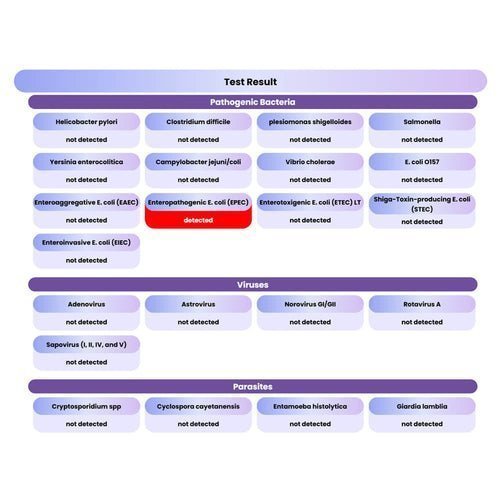
Reviewed by Saskia Knight DipNT, Nutritionist
Last reviewed on January 20, 2025
What are gut parasites?
Gut parasites are tiny organisms that live in the digestive tract that can cause a number of health problems from mild digestive discomfort to serious illness if left untreated.
Many parasites cannot be seen with the naked eye, and this makes it easy for them to spread to humans via contaminated water, food, and person-to-person transmission. Parasites can take many forms and can cause varying degrees of symptoms depending on the type of infection and the individual affected.
Many people associate gut parasites with tropical regions, but these infections can occur anywhere, including the UK.
Common types of parasites
There are two main types of gut parasites that affect humans:
Protozoa:
These are microscopic single-celled parasites. Protozoa will typically cause common symptoms such as diarrhoea, stomach ache, nausea and vomiting. Common examples of protozoa include:
- Giardia lamblia – causes giardiasis, leading to watery diarrhoea and abdominal pain.
- Cryptosporidium spp. – causes cryptosporidiosis, known for long-lasting diarrhoea.
- Entamoeba histolytica – causes amoebiasis, which can lead to severe intestinal inflammation and liver abscesses.
- Cyclospora - causes cyclosporiasis, an infection of the intestines that leads to long-lasting watery diarrhoea.
Helminths (Worms):
These are larger, multicellular parasites. Common examples include:
- Tapeworms – flatworms that live in the intestines and absorb nutrients.
- Roundworms (Ascaris lumbricoides) – cause blockages in the intestines in severe cases.
- Hookworms – tiny worms that latch onto the intestinal wall and feed on blood, causing anaemia.
- Pinworms (threadworms) – the most common type of worm infection in the UK, especially in children, causing itching around the anus.
How do gut parasites spread?
Since many parasites are too small to be seen with the naked eye, humans can unknowingly come into contact them. Gut parasites spread through the faecal-oral route, meaning you can become infected when you accidentally ingest parasite eggs or cysts (the infectious form of the parasite) from an infected person’s faeces. Whilst this may seem unrealistic, there are several ways that this can happen:
Contaminated food and water
- Drinking, swimming or swallowing untreated water from lakes or rivers.
- Eating raw or unwashed fruits and vegetables that contain the parasite’s cysts
- Consuming undercooked meat or fish that may contain the parasite’s cysts.
Person-to-person contact
- Parasites like pinworms spread easily in households, schools, and nurseries due to poor hygiene practices among children.
- Changing nappies or caring for someone with an infection can increase the risk of transmission if appropriate hand sanitation is not followed.
Animal contact
- Animals are also prone to infection, so pets, farm parks and petting zoos can increase the risk of transmission.
- In some cases, playing in soil contaminated with animal faeces can lead to infections such as hookworms.
Travel to high-risk areas
- Travelling to tropical or subtropical regions increases the risk of infection, especially in areas where water sanitation is poor.
Common gut parasites and their symptoms
Giardia lamblia (Giardiasis)
How it spreads: Contaminated water, unwashed produce, and close contact with infected people.
Symptoms:
- Watery, foul-smelling diarrhoea
- Stomach cramps and bloating
- Nausea and fatigue
- Pale, greasy stools that float (due to fat malabsorption)
Symptoms of Giardiasis will typically appear 1-2 weeks after encountering the parasite.
Cryptosporidium spp. (Cryptosporidiosis)
How it spreads: Contaminated water (including swimming pools), unwashed produce, and contact with infected people or animals.
Symptoms:
- Long-lasting watery diarrhoea
- Abdominal pain and cramping
- Low-grade fever
- Weight loss due to dehydration
Symptoms can appear 2-10 days after being exposed to the parasite and can last for up to 4 weeks.
Entamoeba histolytica (Amoebiasis)
How it spreads: Contaminated food and water, especially in tropical regions.
Symptoms:
- Bloody or mucus-filled diarrhoea
- Severe stomach pain
- Fever
- In severe cases, liver abscesses
Tapeworms (Taeniasis)
How it spreads: Eating undercooked or raw meat (especially pork or beef) containing tapeworm cysts.
Symptoms:
- Mild digestive discomfort or no symptoms in some cases
- Visible tapeworm segments in stools
- Unexplained weight loss
- Nutrient deficiencies
Pinworms (Threadworms)
How it spreads: Swallowing pinworm eggs after touching contaminated surfaces, bedding, or toys.
Symptoms:
- Intense itching around the anus, especially at night
- Irritability and difficulty sleeping
- Restlessness in children
Hookworms
How it spreads: Walking barefoot on contaminated soil.
Symptoms:
- Anaemia (due to blood loss)
- Fatigue and weakness
- Abdominal pain
How are gut parasite infections diagnosed?
To accurately diagnose a parasitic infection, specific testing is required to confirm the presence of a parasite. Various tests may be used to detect traces of the parasite’s DNA, whilst other methods may involve blood samples or scans, particularly if there is evidence that the parasite has spread beyond the gut. The most common ways of testing for a parasite are:
Stool sample testing
A stool test is the most common way to diagnose gut parasites, and our preferred method of testing. Stool samples can be done at home and sent off to a lab to confirm the presence of parasite eggs, cysts, or DNA. It is not uncommon to be asked to supply multiple stool samples over several days as parasite cysts can be intermittent so may not appear in a single stool test.
Stool tests can be used to identify common parasites such as – Cryptosporidium, Cyclospora, Giardia and more. Our gut parasite test helps to identify 22 types of parasites, pathogenic bacteria and viruses.
Stool tests, particularly microbiome tests can range in their level of comprehensiveness when it comes to testing for gut parasites. Some stool tests may only test for parasites but may neglect microbiome testing, whereas other tests may only test the microbiome and neglect parasite testing. Comprehensive gut health tests such as the Gi Map test and out complete gut microbiome test include both a microbiome and parasite testing panel.
Blood tests
A blood test can be used to detect liver fluke (a type of parasitic flatworm that lives in the liver and bile ducts) infections by identifying signs of an immune response or damage caused by the parasite.
Imaging tests
In cases where parasites manage to spread outside the intestines (liver abscesses), an ultrasound or CT scan may be used to detect complications.
How are gut parasite infections treated?
The need for treatment of gut parasites depends on the type of parasite and the individual’s overall health. In some cases, the immune system can successfully combat the infection. However, for many types of gut parasites, treatment is recommended to prevent complications, shorten the duration of symptoms, and reduce the risk of spreading the infection to others.
Protozoa treatments
Giardia lamblia (Giardiasis):
In most cases, treatment with medication (such as metronidazole or tinidazole) is needed to clear the infection.
Giardiasis can persist for weeks or months without treatment, causing chronic diarrhoea, nutrient malabsorption, and weight loss.
Cryptosporidium spp. (Cryptosporidiosis):
In healthy individuals, cryptosporidiosis can sometimes clear on its own within 1-2 weeks. However, it can cause prolonged symptoms and dehydration.
Entamoeba histolytica (Amoebiasis):
Most people infected with Entamoeba histolytica do not develop symptoms. However, around 1 or 2 in 10 people with amoebiasis will develop symptoms.
This parasite often causes invasive infections that do not clear on their own and can lead to liver abscesses and serious complications.
Treatment with antibiotics (such as metronidazole) followed by an anti-cyst medication (e.g., paromomycin) is essential to clear both the active infection and prevent recurrence.
Helminths (Worm infections) treatments
Helminths, such as roundworms, tapeworms, and pinworms (threadworms), generally require treatment, though the severity and progression of the infection can vary:
Examples and treatment recommendations:
Pinworms (Threadworms):
Pinworms rarely clear up on their own.
Treatment with medications such as mebendazole or albendazole is usually required, along with hygiene measures to prevent reinfection (e.g., regular washing of bedding, clothes, and thorough handwashing).
Since pinworm eggs spread easily, it’s common practice to treat all household members simultaneously.
Tapeworms (Taeniasis):
Tapeworm infections can persist for years without treatment, causing nutrient deficiencies, unexplained weight loss, and other complications.
In some cases, people may not know they’re infected until they pass segments of the tapeworm in their stool.
Treatment with praziquantel or niclosamide is usually required to kill the tapeworm so that the body can expel it.
Roundworms (Ascariasis):
Mild infections with roundworms may not cause noticeable symptoms and can resolve as the worms die naturally.
However, in moderate to severe infections, treatment with albendazole or mebendazole is needed to kill the worms and prevent complications like intestinal blockages.
Hookworms:
Hookworm infections rarely clear on their own and can cause chronic blood loss, leading to anaemia.
Treatment with albendazole or mebendazole is typically required to kill the worms, along with iron supplements to treat anaemia.
Rehydration treatment
Diarrhoea is one of the most common symptoms of a gut parasite infection, therefore it is important to replace lost fluids with electrolytes or oral rehydration solutions.
Nutritional treatment
Parasites can disrupt the balance of the gut, leading to impaired nutrient absorption and resulting in deficiencies of certain vitamins and minerals. A gut imbalance (dysbiosis) can also prolong the symptoms of a parasitic infection. Eating a gut-healthy, nutrient-rich diet can restore the balance of the gut microbiome and even reduce recovery time.
What foods help you to recover from a parasite?
High fibre diet: Including foods like - fruits, vegetables, whole grains, nuts, legumes, and seeds. Introduce fibre to your diet slowly and remember to drink plenty of fluids.
Probiotic foods: Yoghurt, kefir, and fermented vegetables, like kimchi and sauerkraut help replenish beneficial bacteria in the gut.
Hydration: Drink plenty of fluids and avoid alcohol and caffeine, as they can worsen dehydration.
Read our guide on good gut foods for a full breakdown of foods that can help to improve your gut health.
Can gut parasites be prevented?
Whilst exposure to a parasite is not something that can be prevented, there are certain safety measures that you can adopt that can reduce your risk of infection.
Follow food safety procedures:
- Thoroughly wash fruits and vegetables under clean, running water.
- Avoid eating raw or undercooked meats.
Water safety:
- Drink bottled or boiled water in areas where sanitation is poor, particularly areas that are classed as high-risk.
- Avoid adding ice cubes into your drink in high-risk countries.
Personal hygiene:
- Wash your hands with soap and water after using the toilet.
- Follow the same procedure before and after handling food.
- Regularly clean household surfaces, especially in bathrooms and kitchens.
- Teach children good hygiene habits to prevent the spread of parasites in nurseries and schools.
Gut health and parasites
Maintaining a healthy gut microbiome can make it more difficult for a parasite to establish an infection. It can also reduce the severity of symptoms that you may experience because of an infection.
A healthy gut microbiome plays a key role in defending against infections. A balanced and diverse microbiome helps strengthen the gut lining and supports your immune system. After a parasitic infection, the balance of your gut microbiome may have been disrupted, so eating prebiotic and probiotic-rich foods can help rebuild your microbiome and restore gut health.
A gut health test can be used to identify gut dysbiosis after a parasitic infection. A full report and personalised recommendations on how to improve your gut health will also be provided.
Conclusion
Gut parasites are more common than you might think and can cause a wide range of symptoms, from mild digestive issues to more serious complications. While infections are more frequent in certain parts of the world, they can still occur in the UK, particularly through poor hygiene or exposure to contaminated food or water.
By practising good hygiene, being mindful of food and water safety, and supporting your gut health, you can reduce your risk of infection. If you suspect you have a gut parasite, a stool test can provide answers and guide treatment. Supporting your recovery with the right diet and hydration will help you bounce back and protect your long-term digestive health.



